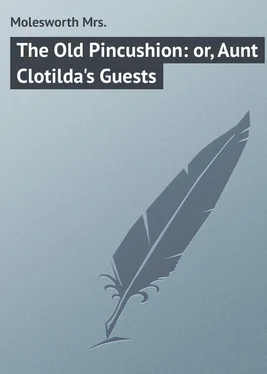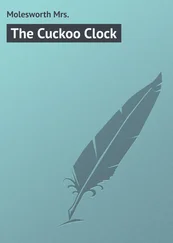Mrs. Molesworth - The Old Pincushion - or, Aunt Clotilda's Guests
Здесь есть возможность читать онлайн «Mrs. Molesworth - The Old Pincushion - or, Aunt Clotilda's Guests» — ознакомительный отрывок электронной книги совершенно бесплатно, а после прочтения отрывка купить полную версию. В некоторых случаях можно слушать аудио, скачать через торрент в формате fb2 и присутствует краткое содержание. Издательство: Иностранный паблик, Жанр: foreign_prose, foreign_children, на английском языке. Описание произведения, (предисловие) а так же отзывы посетителей доступны на портале библиотеки ЛибКат.
- Название:The Old Pincushion: or, Aunt Clotilda's Guests
- Автор:
- Издательство:Иностранный паблик
- Жанр:
- Год:неизвестен
- ISBN:нет данных
- Рейтинг книги:5 / 5. Голосов: 1
-
Избранное:Добавить в избранное
- Отзывы:
-
Ваша оценка:
- 100
- 1
- 2
- 3
- 4
- 5
The Old Pincushion: or, Aunt Clotilda's Guests: краткое содержание, описание и аннотация
Предлагаем к чтению аннотацию, описание, краткое содержание или предисловие (зависит от того, что написал сам автор книги «The Old Pincushion: or, Aunt Clotilda's Guests»). Если вы не нашли необходимую информацию о книге — напишите в комментариях, мы постараемся отыскать её.
The Old Pincushion: or, Aunt Clotilda's Guests — читать онлайн ознакомительный отрывок
Ниже представлен текст книги, разбитый по страницам. Система сохранения места последней прочитанной страницы, позволяет с удобством читать онлайн бесплатно книгу «The Old Pincushion: or, Aunt Clotilda's Guests», без необходимости каждый раз заново искать на чём Вы остановились. Поставьте закладку, и сможете в любой момент перейти на страницу, на которой закончили чтение.
Интервал:
Закладка:
It had been a terrible disappointment to him, and he had hoped for thorough sympathy from Kathie. Yet again, perhaps it was well that she had not taken it to heart so acutely as he. She was less happily placed under Miss Eccles' trustworthy, but cold and unloving care, than he in the Fanshaw family. And had she been of a more sensitive or less buoyant nature, she might have been in some ways dwarfed and crushed painfully. But she was strong and elastic; so far, her six years of stiff and prim school life had done her no harm beyond leaving her, in several ways, as much of a 'baby' as when they had first begun. Still, Neville's instinct that it was more than time that Kathie should be in other hands, that the 'womanliness' in her would suffer unless there were some change, was a correct one.
'If only Mrs. Fanshaw could have had her too,' he said to himself, as he had often said before.
But that he knew was impossible. The Fanshaws had four boys of their own, and no daughter, which had naturally led to their taking only boy boarders.
'I don't like to make things worse by writing to mamma that I don't think Kathie is improving,' he went on, thinking. 'I know it must be very difficult for them to pay what they do for us. And Mrs. Fanshaw always says that Miss Eccles' school is far better, though it is old-fashioned and prim, than many of those great, big, fashionable, girls' schools, which cost twice as much.'
Suddenly a thought struck him.
'I don't see why I shouldn't write about Kathie to Aunt Clotilda,' he said to himself. 'She is free now, even though she's poor. She might surely have Kathie with her if papa gave what he does to Miss Eccles. And she's often said she would have had us every holiday if Mrs. Wynne hadn't been so old and queer. I think Aunt Clotilda must be nice – she is so fond of papa. She might at least have Kathie there on a visit.'
And with a rather more hopeful feeling about things in general since this idea had struck him, poor Neville rang at Mr. Fanshaw's door, which he had now reached.
He had met with plenty of sympathy from his kind friends in his disappointment. It was Mrs. Fanshaw who had suggested to her husband to give the boy an hour or two's holiday to go off to see his sister, though not an orthodox day for the two meeting, and who had furthermore promised the invitation which had so delighted Kathleen. But a feeling of loyalty prevented Neville's telling how slightly the bad news seemed to have affected the little girl, and besides this, a sort of instinct that the less family matters are talked of out of the family the better, made him resolve not to say very much more about the matter in the Fanshaw household.
What the bad news was it is quite time to explain.
Neville and Kathleen Powys were the children of an officer in the army. Captain Powys was poor, but not without reasonable hopes of becoming much richer before his boy and girl should have reached the age at which education and the other many advantages which good parents desire for their children, grow expensive and difficult to obtain for those who have very small means. One disadvantage – a disadvantage at all ages – that of separation from their parents, had to be submitted to, however, when Neville and Kathleen were only five and six years old. For at that time Captain Powys's regiment was ordered to India, and he had, of course, to accompany it.
'Never mind – or, at least, mind it as little as you can,' he said to his wife. 'Let us be thankful they are still so young. By the time they are at an age when it really would matter greatly, we may quite hope to be settled at home again.'
And in this hope the last few years had been passed. It was not an unreasonable hope by any means, as you shall hear. Captain Powys had an old cousin, who was also his godmother, by name Mrs. Wynne. And for many years this lady had openly announced her intention of making him her heir. Only last year she had written to beg him to try to get leave to come home for some months, as she felt she had not long to live, and there were many things she wished to say to him. She undertook to pay all the expenses of this visit for himself and his wife, and the little girl Vida, who had been born since their return to India. And as a reason the more for it, she reminded him that it was high time Neville and Kathleen should see their parents again. Captain Powys, as may be imagined, was only too glad to agree to her proposal, and for the last few months the parents in India and the children at home had been counting the weeks – in Neville's case, indeed, almost the days – till they should meet, when, alas! all these plans were dashed to the ground!
Mrs. Wynne died suddenly, and after her death no will was to be found. In consequence of this, all her property would go to a nephew of her husband's, already a rich man, who did not need it, and, to do him justice, scarcely cared for it. This was the news which Miss Clotilda Powys, the children's aunt, who had lived with the old lady and helped to manage her affairs, had to write to her brother in India. And this too was the news contained in the letter from his father which had so distressed poor Neville.
It was a curious story altogether. Clotilda was completely puzzled. Mrs. Wynne was a careful and methodical person, not likely to have delayed seeing to business matters, and just the sort of woman to have prided herself on leaving everything in perfect order. And a day or two before her death she had given her cousin a sealed envelope, on which was written, 'Directions where to find my will;' saying to her at the same time, 'You will see – all will be right for David.' So Miss Clotilda's mind had been quite at rest, till on opening the envelope, a few hours after the old lady's death, she drew forth a blank sheet of note-paper! Even then, however, she was not completely discouraged. That the will was somewhere in the house she felt certain, for she had often heard Mrs. Wynne say that she would trust no important papers to any one's keeping but her own. And in the presence of the lawyer, Mr. Jones, and of Mr. Wynne-Carr, the nephew, a thorough search was made. Every cupboard, every bookcase, every wardrobe, every chest of drawers was turned out – nay, more, the walls were tapped, the planks of the floors examined, for it was a very old and quaintly contrived house, to see if there was any secret place where the will could have been concealed. But all in vain. Every other paper or document of importance was found in its place, neatly labelled in the old lady's own handwriting, in her private secrétaire in the library. But no will! And even though poor Miss Clotilda went on for days and weeks searching, searching, thinking of nothing else by day, dreaming of nothing else by night, all was useless, and it became evident that there would not much longer be any pretext for preventing Mr. Wynne-Carr's taking possession.
Mr. Wynne-Carr behaved well. He had never expected to succeed, and was not eager about it. He could not, however, help himself – he had a son and grandson – he could not give up the property even if Captain Powys could have been brought to accept it from him. But he told Miss Clotilda to take her time. He gave her leave to stay on in the house as long as she liked, and to continue searching. But as weeks went on, her last hopes faded, and she wrote again to her brother, advising him to make up his mind that the will would never be found. Then Captain Powys wrote to Neville – he had put off doing so as long as he could – telling him all, and saying that even the visit to England must be given up, as he had no money to spare for it, and no hopes of gaining anything by it. If Miss Clotilda had not succeeded in finding the will, there was no chance that any one else would.
Neville was old enough, and thoughtful enough, thoroughly to understand the whole. No wonder he was troubled and distressed, and disappointed by Kathie's childishness. He wished his Aunt Clotilda had written to him. It would have made it much easier for him to have confided to her his feelings about his sister. It was many years since Miss Clotilda had seen the children, for she had not left Wales for long, and Mrs. Wynne had never invited the children to visit her. She was too old for it, she said, and she had never had children of her own, and did not understand their ways. So Neville and Kathleen had been entirely left to the care of strangers, though Neville had once or twice been asked to spend some holidays at a companion's house, and Kathie was taken every year to the seaside with two other 'little Indians,' for three weeks by Miss Eccles.
Читать дальшеИнтервал:
Закладка:
Похожие книги на «The Old Pincushion: or, Aunt Clotilda's Guests»
Представляем Вашему вниманию похожие книги на «The Old Pincushion: or, Aunt Clotilda's Guests» списком для выбора. Мы отобрали схожую по названию и смыслу литературу в надежде предоставить читателям больше вариантов отыскать новые, интересные, ещё непрочитанные произведения.
Обсуждение, отзывы о книге «The Old Pincushion: or, Aunt Clotilda's Guests» и просто собственные мнения читателей. Оставьте ваши комментарии, напишите, что Вы думаете о произведении, его смысле или главных героях. Укажите что конкретно понравилось, а что нет, и почему Вы так считаете.












